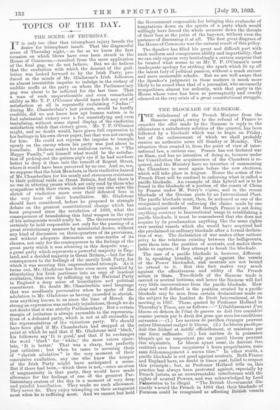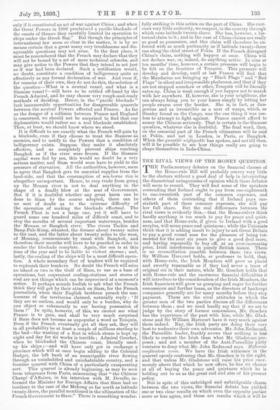THE BLOCKADE OF BANGKOK.
find substantial victory over a foe unsatisfying and even THE withdrawal of the French Minister from the tantalising, without some signal display of the vindictive Siamese capital, owing to the refusal of France to satisfaction which that victory gives. Mr. T. P. O'Connor consider the offer made by the Siamese in reply to the might, and no doubt would, have given full expression to ultimatum a satisfactory solution of the quarrel, has been his feelings in his own clever paper, but that was not enough followed by a blockade which was to begin on Friday for him. He could not repress the impulse to trample but of the enforcement of which we shall probably r situation thus created is, from the point of view of inter- national law, a curious one. France has not declared war tion of picking-out the guinea-pig's eye if he had nowhere on Siam, and has no intention of doing so, because under better to drop it than into the tumult of Regent Street, her Constitution the acquiescence of the Chambers is re- we suppose that the Irish Members, in their vindictive hatred quired, and the Ministry have no intention of summoning the Chambers to meet again before the new elections, of Mr. Chamberlain for his manly and strenuous resistance which will take place in August. Hence the action of the , is to be French Fleet will be confined to enforcing what is called ai no use in uttering pecans which are only read by those who pacific blockade. An example of this hybrid act sympathise with their views, unless they can also raise the found in the blockade of a portion of the coasts of China shriek of vindictive scorn over their defeated foes in by France under M. Ferry's regime, and in the recent the very hour of their humiliation. Mr. Gladstone blockade of the Grecian ports by an International Fleet. should have considered, before he proposed to strangle The pacific blockade must, then, be reckoned as one of the r debate on the greatest constitutional change which has recognised methods of enforcing the claims made by one been proposed since the revolution of 1688, what the nation against another. But though France is not doing a. consequences of brandishing this fatal weapon in the eyes anything contrary to International usage in establishing of his antagonists would really be. The Government must pacific blockade, it must be remembered that she does not certainly be held responsible not only for the passing of a acquire by its proclamation anything like the same rights great revolutionary measure by ministerial decree, without over neutral vessels which she would have acquired had a- any kind of discussion on three-quarters of its provisions, ,sable to capture, if they attempt to break the blockade. only if it constituted an act of war against China ; and when the Great Powers in 1886 proclaimed a pacific blockade of the coasts of Greece they carefully limited its operation to ships under the Greek flag." But though the principles of international law seem so clear in the matter, it is by no means certain that a great many very troublesome and dis- agreeable questions may not arise. In the first place, it must be remembered that the French may declare that they will not be bound by a set of mere technical cobwebs, and may give notice to the Powers that they intend to act just as if war had been declared. Such a notification would, no doubt, constitute a condition of belligerency quite as effectively as any formal declaration of war. And even if, for reasons of their own, they do not do this, the solution of the question—What is a neutral vessel, and what is a Siamese vessel P—will have to be settled off-hand by the French Admiral, and he may choose very rough-and-ready methods of deciding. Hence, in the " pacific blockade " lurk innumerable opportunities for disagreeable quarrels between the neutral Powers affected and France. As far as the danger of a collision between France and England is concerned, we should not be surprised to find that our diplomatists would rather see a real blockade established. Then, at least, we should know where we stood.
It is difficult to see exactly what the French will gain by a blockade, even if they choose to treat the Siamese as enemies, and to notify to the Powers that a condition of belligerency exists. Suppose they make it absolutely effective, and as completely prevent ships reaching Bangkok as if the river were frozen. If the Siamese capital were fed by sea, this would no doubt be a very serious matter, and Siam would soon have to yield to the pressure of starvation. All the authorities, however, seem to agree that Bangkok gets its essential supplies from the land-side, and that the consumption of sea-borne rice is altogether unimportant. Hence, to stop trade from going up the Menam river is not to deal anything in the shape of a deadly blow at the seat of Government, But if it is doubtful whether any great harm can be done to Siam by the course adopted, there can be no sort of doubt as to the extreme difficulty of the operation of making the blockade effectual. The French Fleet is not a large one, yet it will have to guard some one hundred miles of difficult coast, and to stop the mouths of several important waterways, besides the Menam or Bangkok river. The rivers Tachin and Bang-Pak-Kong, situated, the former about twenty miles to the east, and the latter about twenty miles to the west, of Menang, communicate by canal with Bangkok, and therefore their mouths will have to be guarded in order to render the blockade complete. Again, the sea is at this time of the year said to be liable to violent storms ; and, lastly, the coaling of the ships will be a most difficult opera- tion. A whole secondary fleet of tenders will be required to replenish their bunkers. No doubt the French will seize an island or two in the Gulf of Siam, to use as a base of operations, but convenient coaling-stations and stores of coal are not things'which can be improvised at a moment's notice. It perhaps sounds foolish to ask what the French think they will get by their attack on Siam, for the French journalists, when their English brethren preach the use- lessness of the territories claimed, naturally reply : If they are so useless, and would only be a burden, why do you object so vehemently to our having possession of them F' In spite, however, of this, we cannot see what France is to gain, and shall be very much surprised if Siam does not become as unpopular a word as Tonquin. Even if the French eventually get all they ask, they will in all probability be at least a couple of millions sterling to the bad—the wasting of a fleet in which steam is kept up night and day for six weeks is terrible ; Admiral Courbet, when he blockaded the Chinese coast, literally used- up his ships ;—and will have only got in exchange a province which will at once begin adding to the Colonial Budget, the left bank of an unnavigable river flowing through an uninhabited and uninhabitable country, and a frontier quarrel with China of a particularly exasperating sort. This quarrel is already beginning, as may be seen from telegrams from Paris, announcing that " the Chinese Charge d'Affaires, in his interview with M. Develle, in- formed the Minister for Foreign Affairs that Siam had no territory to the east of the Mekong so far north as latitude twenty-three, the parallel mentioned in the ultimatum of the French Government to Siam." There is something wonder- fully striking in this action on the part of China. She exer- cises very little authority, we suspect, in the country through which runs latitude twenty-three. She has, however, a his- torical claim to it ; and in the case of China claims are really as good as possession, and this claim will therefore be en- forced with as much pertinacity as if latitude twenty-three ran along the chief street of Pekin. If the French disregard China's claim, nothing will happen at once. China will not declare war, or, indeed, do anything active. In nine or ten months' time, however, a certain pressure will begin to be felt on the frontiers of Tonquin. This pressure will develop and develop, until at last France will find that the Mandarins are bringing up " Black Flags " and " Red Flags" in silent and irrepressible phalanxes, and that if they are not stopped somehow or other, Tonquin will be literally eaten up. China is weak enough if you happen not to march with her anywhere. If, however, she is your neighbour, she can always bring you to your knees simply by letting her people swarm over the border. She is, in fact, as dan- gerous and as irresistible as a nest of wasps, which, as Stanley found on the Congo, was the one thing it was use- less to attempt to fight against. France cannot afford to annoy the Chinese seriously. That is certain in the Siamese question, whatever else is doubtful. The final word, then, on the essential part of the French ultimatum will be said at Pekin, and not in London, in Paris, or Bangkok. When the quantitg n6gligeable has spoken, and not till then, will it be possible to see how things really are going to shape themselves in Indo-China.



































 Previous page
Previous page